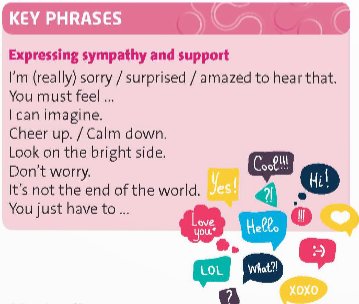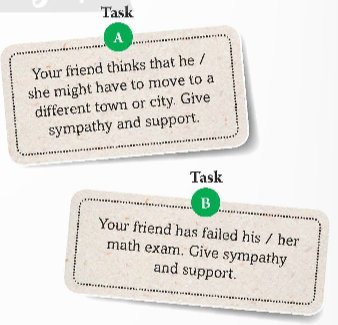Think! Do you ever have to help friends when they’re feeling down? When?
Speaking: Talking about feelings
THINK! (SGK Friends Plus - Trang 44)
Thảo luận (1)
Activity 1 (SGK Friends Plus - Trang 44)
Read and listen to the dialogue. How is Brad feeling? Why?Josie: What’s up, Brad? You look a bit sad.Brad: I didn’t get into the swimming team. Not even the reserves.Josie: Oh no! I’m surprised to hear that. You must feel really fed up.Brad: Yes, I do.Josie: I can imagine. Cheer up - we know that you’re a good swimmer. You mustn’t get too down about it.Brad: I can’t help it. It’s really disappointing.Josie: Hey, look on the bright side. Now you don’t have to get up early for training every day!B...
Đọc tiếp
Read and listen to the dialogue. How is Brad feeling? Why?
Josie: What’s up, Brad? You look a bit sad.
Brad: I didn’t get into the swimming team. Not even the reserves.
Josie: Oh no! I’m surprised to hear that. You must feel really fed up.
Brad: Yes, I do.
Josie: I can imagine. Cheer up - we know that you’re a good swimmer. You mustn’t get too down about it.
Brad: I can’t help it. It’s really disappointing.
Josie: Hey, look on the bright side. Now you don’t have to get up early for training every day!
Brad: Yeah, but I really enjoyed all that.
Josie: Don’t worry. It’s not the end of the world. I’m sure you’ll get another chance. You just have to keep improving.
Brad: I suppose I could try again in the autumn. There are more trials then, and I can practise all summer.
Josie: Exactly. It may even be better then. It’s a busy time now anyway, with all the exams and stuff.
Brad: Hey, you’re right. It might not be so bad after all. Thanks, Josie.
Thảo luận (1)Hướng dẫn giảiBrad is feeling disappointed and sad because he didn’t get into the swimming team, not even as a reserve.
(Brad cảm thấy thất vọng và buồn bã vì không được vào đội bơi lội, thậm chí không được dự bị.)
(Trả lời bởi datcoder)
Activity 2 (SGK Friends Plus - Trang 44)
When we speak, we can convey our feelings with the tone of our voice. Read the Key Phrases. Then listen again and practise the dialogue. Try to use a sympathetic tone of voice.

Activity 3 (SGK Friends Plus - Trang 44)
Watch or listen to another dialogue. Answer the questions with a partner.
1. What’s Jan’s problem?
2. What does Ned say about London?
3. How does Jan feel at the end?
Activity 4 (SGK Friends Plus - Trang 44)
Watch or listen again. Which key phrases do you hear?
Activity 5 (SGK Friends Plus - Trang 44)
Read tasks A and B. Which situation did you watch or hear in exercise 3?

Activity 6 (SGK Friends Plus - Trang 44)
USE IT! Work in pairs. Act out situation A or B.